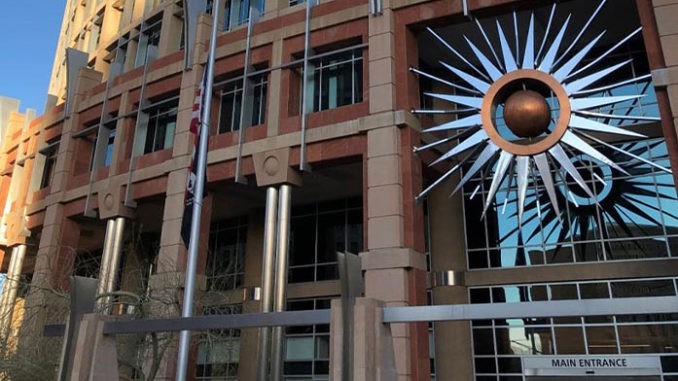
by Corinne Murdock | Apr 3, 2023 | Education, News
By Corinne Murdock |
The University of Arizona (UArizona) has a new program teaching students how to lawfully run a marijuana business.
The program, Cannabis Compliance & Risk Management, awards a certificate in cannabis compliance upon completion. The course also awards one year of Association of Certified Commercial Cannabis Experts (ACCCE) membership, which comes with additional resources and training materials.
The program consists of three courses lasting eight weeks each, all of which are offered exclusively online: Cannabis 101, Cannabis Compliance and Risk Management I, and Cannabis Compliance and Risk Management II.
The first course, Cannabis 101, reviews the historical, cultural, and industrial backgrounds of cannabis. Topics include: history of cannabis, phytocannabinoids and the endocannabinoid system, agriculture and cultivation, enterprise, law and policy, cannabis medicine and healthcare, and careers in the cannabis industry.
In a sample video of the course, Professor David Bearman dispelled a common misconception that CBD doesn’t have psychoactive effects, noting that it suppresses anxiety and depression without the euphoric side effects.
Bearman reviewed the history of medicinal cannabis; he stated that the first study on medicinal cannabis was issued in the 1940s, but it wasn’t until decades later that greater implementation of the drug was studied. Bearman also reviewed the difference between marinol, the synthetic form of the drug, and cannabis, the natural form of the drug.
The second and third courses, Cannabis Compliance and Risk Management I and II, focus on risk assessment, including illicit markets, money laundering, and operational aspects; control activities and environment; communication; assurance; the supply chain; and board reporting.
The program costs just under $3,000. UArizona offers a $250 discount via a promotional code for those who register by April 9.
According to the Arizona Department of Revenue (ADOR), the state’s cannabis market has experienced nearly $3 billion in sales since the state began allowing sales in January 2021.
The state legalized recreational marijuana in the 2020 election through Proposition 207.
On the flip side of the revenue boost is the rise in marijuana poisonings in children. The number of children poisoned by cannabis ingestion more than quadrupled over the past two years. These poisonings have increased dramatically despite guardrails within Prop 207 that were supposed to prevent pediatric poisonings. These included requiring manufacturers and dispensaries to use child-resistant packaging and banning the sale of cannabis products in the form of gummy worms and bears.
A key player in getting Prop 207 passed was Ninth Circuit Court Judge Roopali Desai, nominated by President Joe Biden to the court last year.
Corinne Murdock is a reporter for AZ Free News. Follow her latest on Twitter, or email tips to corinne@azfreenews.com.

by Terri Jo Neff | Apr 3, 2023 | News
By Terri Jo Neff |
More than 700 residents, many of whom are children, have been waiting for months for government officials to find a reliable and affordable water source for Rio Verde Foothills after the City of Scottsdale shut off the taps which had supplied water to the residents for years.
But with city and Maricopa County players failing to come to a quick rescue, the Arizona Corporation Commission (ACC) is now slated to try its hand at resolving the problem, adding yet another layer of bureaucracy that worries residents as temperatures continue to increase.
The problem dates back to Jan. 1 when Scottsdale announced its water would no longer be sold to private companies that haul water to the unincorporated Rio Verde Foothills community located north of the city. The homes are part of a wildcat development.
Scottsdale’s public explanation for ending the longtime arrangement was that it was necessary for the city’s drought management response. A variety of proposed solutions have been put forth since then, one being to leave it up to individual residents to arrange their own water purchases.
The majority of the other solutions have involved Maricopa County in some capacity. And therein lies the problem, according to many property owners and residents who believe the county board has not taken the public health situation seriously enough.
An early solution introduced in the Arizona Legislature on an emergency basis would have permitted Maricopa County to enter into an Intergovernmental Agreement (IGA) with Scottsdale to allow water from the city to once again be used by Rio Verde Foothills residents for payment.
County supervisors rejected the IGA plan, causing the legislation to be put on the back burner while long-term political interests took priority over getting residents immediate help.
What the county supervisors proposed was to wash their hands of the problem by having Scottsdale city officials work out a deal with Canada-based EPCOR, a private utility company whose U.S. headquarters is located in Phoenix.
The Maricopa County supervisors issued a resolution to that effect in early March.
Supervisor Tom Galvin, whose District 2 encompasses Rio Verde Foothills and Scottsdale, was vocal about keeping a hands-off approach while leaving desperate residents at the mercy of a major conglomerate.
Some homeowners are also encountering problems trying to sell their property due to the lack of water service.
And with the highly bureaucratic ACC now involved, residents can only wait and see what happens. Some state lawmakers, including Rep. Alex Kolodin and Sen. John Kavanagh, continue to look into legislative options.
In the meantime, Galvin and the other county supervisors have not put forth any alternatives in the event an EPCOR solution is rejected.
Terri Jo Neff is a reporter for AZ Free News. Follow her latest on Twitter, or send her news tips here.

by Daniel Stefanski | Apr 2, 2023 | News
By Daniel Stefanski |
A bill that would expand voting access to those in Arizona detention facilities cleared a major hurdle this week, though it may need some help to get past the finish line.
HB 2325, sponsored by Representative Alex Kolodin, deals with voting procedures for electors in detention. According to the purpose of the legislation provided by the Arizona Senate, HB 2325 “allows a qualified elector in pretrial detention to make a written request to have a ballot personally delivered to a jail for voting and prescribes requirements and procedures for a qualified elector voting from jail.”
On Monday, the Senate Elections Committee took up the bill for consideration before giving it a “do pass” recommendation with a party-line 5-3 vote. Although the Democrats on the committee did not appear opposed to the overarching concept of the bill, they refused to support the legislation even after a significant amount of time asking questions of the bill’s sponsor.
Not all Republicans on the committee, however, were 100% sold on the bill. Senator T.J. Shope encouraged Representative Kolodin to sit down with Arizona counties and other entities responsible for implementing the provisions of the legislation to work through outstanding issues and concerns. He did express appreciation for the bill sponsor’s willingness to address this issue and bring this proposal forward in the Arizona Legislature. Fellow Republican Senator Ken Bennett was a little more direct with his comments, though he voted “aye” on the bill, telling his fellow members that he “was informed his amendments weren’t welcome in committee.” He voted to pass the bill “for now,” but he opined that HB 2325 needed more work – possibly implying that the improvements were needed before it gained enough votes for final passage in the Senate.
At the start of consideration over the bill, Jen Marson with the Arizona Association of Counties shared that there were “a lot of issues” with HB 2325. Some of those concerns included that counties already have a method for people voting from jail, that the bill only addresses people with pre-trial adjudication, that most people are booked into jail without an identification or that detainees are not allowed to keep their identification with them in jail, and that phones could be brought into Arizona jails by those helping to facilitate the voting.
Committee Chair, Senator Wendy Rogers, asked Marson if there was anything about the bill she (or the association she represents) liked, to which Marson explained that “the umbrella statement (that people eligible to vote in a jail environment could vote) we’re on board with” – but the details presented lots of challenges.
Answering a question from Senator Borelli, Marson admitted that her association did not offer an amendment to the legislation because “they (the counties and the bill sponsor) were too far apart” on resolving their differences.
Senator Anna Hernandez was one of three Democrats to vote against the bill in committee but expressed a sense of regret that she couldn’t get to a yes on the legislation. She highlighted her perception that there wasn’t “a lot of willingness to amend this bill,” mentioning the issues of identification and federal detention centers as starting points for changes in a hypothetical new draft that she might be comfortable with. Hernandez did state that she was very supportive of the overall issue addressed by Kolodin’s bill, but because of her outstanding concerns, she would not be on board with the current version.
Daniel Stefanski is a reporter for AZ Free News. You can send him news tips using this link.

by Corinne Murdock | Apr 2, 2023 | News
By Corinne Murdock |
An Arizona legislator informed his constituents that he wouldn’t be caving to their demands for supporting gun control legislation. The call to action has mainly come from left-leaning groups and activists in the wake of the Covenant School shooting in Nashville, Tennessee that left three young children and three adults dead.
State Rep. John Gillette (R-LD30) announced his intent in a letter issued Thursday. Gillette advised his constituents, at length, for his rationale for not supporting greater gun control: criminals can work around gun control measures to obtain weapons, citing the Nashville shooter lied on her background check to obtain guns; FBI data shows no correlation between gun control and crime reduction; and that crime generally correlates with law enforcement procedures and economic factors.
“Controlling a physical object has zero effect on human behavior,” said Gillette. “Laws are followed by law-abiding citizens, not criminals and not people who suffer from mental illness.”
Gillette further noted that no National Rifle Association (NRA) member, licensed firearms dealer, or “right-wing” activist had committed a mass shooting.
“These murders were committed by mentally unstable left-leaning adults that were known to law enforcement or mental health professionals or both,” said Gillette.
Gillette disclosed that he would be open to legislation imposing the death penalty on those who commit a mass shooting, as well as legislation imposing civil penalties on any agency or licensee that failed to report or act on a credible threat.
Gillette also pointed out that FBI data hasn’t been updated for the last eight quarters — since 2021.
Following the shooting, Democratic legislators and activists called for stricter gun control.
State Sen. Anna Hernandez (D-LD24) claimed that the shooting occurred because guns have more rights than individuals.
“Instead of finding solutions to end gun violence we continue to see legislation across the nation that grants more rights and protections to guns rather than legislation to mitigate the loss of human life to mass shootings and other gun violence,” said Hernandez.
State Rep. Laura Terech (D-LD04) used the tragedy to promote her legislation barring school blueprints and floor plans from being publicly available.
“The senseless act of violence in Nashville further shows the need for sensible policy to keep our children safe from gun violence,” tweeted Terech. “My bill #HB2075 will keep school blueprints and floorplans [sic] from public view.”
State Rep. Nancy Gutierrez (D-LD18) also promoted Terech’s bill, and said that the deaths were proof that guns were the cause of the school shooting. It has been widely reported that the shooter — a 28-year-old woman that struggled with gender identity issues — had a manifesto which outlines the reason for her killing spree. The manifesto remains unpublished.
“The shooting in Nashville is another failure of the US to stop our gun problem,” stated Gutierrez.
State Rep. Leezah Sun (D-LD22) blamed those opposing stricter gun control for the deaths.
“We cannot keep letting our children die while we fail to pass gun control on the basis of ‘political differences,’” said Sun.
Corinne Murdock is a reporter for AZ Free News. Follow her latest on Twitter, or email tips to corinne@azfreenews.com.

by Terri Jo Neff | Apr 1, 2023 | Economy, News
By Terri Jo Neff |
An Arizona company has announced plans to ship African-mined cobalt to Mexico, then truck it north to be processed at a new, state-of-the-art facility in Yuma County so it can be sold to companies that make batteries for Electric Vehicles (EVs).
EVelution Energy is expected to start construction of its Yuma cobalt processing facility next year, with a goal of being operational no later than early 2026. It forecasts more than 1,000 construction phase jobs, along with 60 direct and 300 indirect jobs once the facility is fully functional.
Cobalt is a rare, ferromagnetic metal primarily used in lithium-ion batteries and in the manufacture of magnetic, high-strength alloys. Dating back to 3000 BC, cobalt was mostly used for its blue coloring in the making of ceramics and glass.
Other uses were limited due to the fact arsenic fumes are a by-product of smelting. But new processing methods in the last few decades changed all of that.
In March, the Yuma County Board of Supervisors unanimously approved a special-use permit allowing EVelution to move forward with construction on 139 acres just east of the City of Yuma and south of the Kofa National Wildlife Refuge.
The property, which spans Union Pacific Railroad tracks and U.S. Interstate 8, is located within one of Arizona’s Qualified Opportunity Zones which provide a wide range of tax incentives for private, long-term investments in economically distressed communities.
There are also various federal economic development incentives currently available for EVelution Energy’s project, such as the Inflation Reduction Act and the Infrastructure Investment and Jobs Act.
According to the U.S. Geological Survey, nearly two-thirds of all mined cobalt (150,000 tonnes in 2019) comes from the Democratic Republic of the Congo (100,000 tonnes in 2019). The USGS also estimates there is about 4 million tonnes of cobalt reserves on the African continent, and another 3 million tonnes globally.
EVelution plans to transport cobalt hydroxide feedstock sourced from the Democratic Republic of the Congo to a port in Ensenada, Mexico, a roughly four hour trip by truck to the Yuma processing facility. And the company knows there is domestic market for its product.
Currently, more than 70 percent of the world’s battery grade cobalt is processed in China. That puts U.S.-based Electric Vehicle manufacturers overly reliant on imports.
The Yuma cobalt facility’s expected annual 7,000 tonnes capacity could meet 40 percent of the expected demand for U.S.-produced EVs in 2027.
The forecasted $55 million economic benefit from EVelution Energy’s project is very much needed, particularly in southwestern Arizona. However, two environmental concerns will be closely monitored even though Yuma County approved the company’s special use permit.
First is the sourcing and disposal of water. EVelution expects to use 74 million gallons of water per month. The water will be sourced from aquifers running under the property, likely via wells which will run more than 1,000 feet deep.
“Our water usage is therefore not expected to impact the surrounding area’s water table/groundwater,” the company says, adding that a water treatment plant will allow for about 70 percent of its used water to be recycled.
The second concern is the disposal of “tailings,” which are the unused materials which remain after processing. EVelution intends to minimize risks of potential contamination to its or surrounding land by foregoing on-site tailing ponds.
“Tailings will be collected, transported and safely disposed of at a licensed local landfill located less than 20 miles away,” the company says.
EVelution Energy is also focused on transitioning to a net zero carbon future. Getting there will mean building a 38.4 MW (peak) solar power array to power the processing plant. The company expects to use excess power from the day to recharge its battery storage.
There is also the possibility some of the excess electricity can be sold to a local power utility to service nearby agricultural companies.
“Solar power will heat the water and process solutions for hydrometallurgical cobalt processing,” according to the company’s website. ‘This heated solution will be stored at temperature in large storage tanks overnight. Using solar power rather than propane or natural gas will further reduce our carbon-footprint.”
As with most mining operations in Africa, there are concerns with the health impacts to workers and with the use of child labor. EVelution’s website shows the company is aware of those issues.
“We are committed to sourcing cobalt in a socially responsible manner, preventing child labor and to promoting respect for human rights of people employed in or affected by our cobalt supply chain,” the website states. “We plan to source our cobalt only from companies that comply with the guidelines of the Responsible Cobalt Initiative.”
EVelution’s proximity to California could lead to further revenue streams, given that state’s early acceptance of EVs.
With EV batteries being quite heavy, and thus expensive to transport, the company is “well positioned to potentially recycle EV batteries from electric vehicles that reach the end of their product lifespan,” its website notes. “The oldest electric vehicles are predominantly located in California and therefore their batteries will be in need of recycling the soonest.”
Terri Jo Neff is a reporter for AZ Free News. Follow her latest on Twitter, or send her news tips here.

by Corinne Murdock | Apr 1, 2023 | News
By Corinne Murdock |
On Thursday, Phoenix had the grand opening of a $12 million community center, days after a court ruled that it had refused to clean up the massive homeless encampment downtown.
Phoenix Mayor Kate Gallego announced the 34,000-square-foot community center, noting that she’d been working on the project since her election in 2019. That was the same year that the homeless crisis began.
Funding for the community center came from the Parks and Preserve Initiative, which sets aside one cent of sales tax for every $10 spent to improve and renovate parks, as well as to expand and improve the city’s desert preserve system.
As AZ Free News reported in its investigative series on The Zone, the homeless crisis has a devastating impact on Phoenix’s ground and waterways.
The community center is located about eight miles south of the homeless encampment (The Zone). It has an elevated track, basketball court, kitchen, fitness center, gaming room, outdoor movie theater, art installation, and a sensory room.
The city opened the community center a day before the holiday celebrating its namesake: the civil rights and union activist Cesar Chavez.
During the grand opening ceremony, Gallego called the community center a “showpiece” that represents city values. Gallego disclosed that the city had to jump through a lot of hoops to find the funding to finish the project.
“We put inclusivity at the forefront. This building really shows our values,” said Gallego. “[W]e really had to work as a team to find out how to fund this project. Most city projects have fairly simple funding resources, but this one was quite complex with bond funding, impact fees, [and] a little bit of federal funding.”
The city held its groundbreaking for the community center in September 2020. That was eight months after the residents and business owners within The Zone, the massive homeless encampment downtown, presented a plan to mitigate the burgeoning homeless with outdoor shelter or camping spaces on city land. According to the Maricopa County Superior Court ruling, the city generally ignored their pleas and their plans.
The Maricopa County Superior Court ruled on Monday that the city of Phoenix was at fault for the homeless crisis, which began around 2019 after the city essentially stopped enforcing laws on the homeless.
The city initially projected the community center to be completed last spring or early summer. It’s the city’s first community center established since 2007.
Corinne Murdock is a reporter for AZ Free News. Follow her latest on Twitter, or email tips to corinne@azfreenews.com.






